I’ve been somehow managing to not see James Marsh‘s Project Nim, which someone called “the monkey movie” during Sundance ’11, but that will soon change as it opens in Los Angeles the day after tomorrow. Here’s A.O. Scott‘s 7.7 N.Y. Times review.
Thanks, Guys!
The San Francisco Dolby team said farewell tonight to visiting journos and tecchies with a 9 pm dinner at the Mark Hopkins hotel. I have lots of notes, riffs and impressions to file after returning to Los Angeles tomorrow morning, but thanks to Joshua Gershman, Joan Levy, Kelli Havlik, Daniel Schneider and Julie Mathis for being thorough, thoughtful and tireless in taking care of their visitors.

The San Franciso Dolby p.r. team (l. to r.): Joan Levy, Josh Gershman, Kelli Havlik, Julie Mathis and Daniel Schneider.
Bounty Bluray
It was announced today that four months hence Warner Home Video will release a Mutiny on the Bounty Bluray. (The ’62 version, I mean.) This is a major deal for me because this half-good, half-problematic sea epic was shot in Ultra Panavision 70, meaning it will look exceptionally vibrant and detailed in high-def. Perhaps not as sharp and gleaming as WHV’s forthcoming Ben-Hur Bluray, which was scanned in 8K, but both were shot in the same 70mm anamorphic process, and will be presented in an aspect ratio of 2.76 to 1.
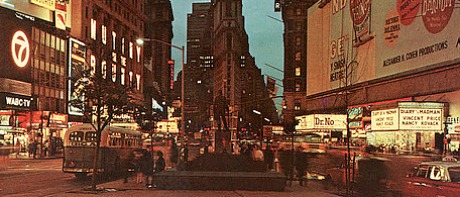
A little less than five years ago I wrote the following about the ’06 DVD version:
“Say what you will about the ’62 Bounty — historical inaccuracies and inventions, Marlon Brando‘s affected performance as Fletcher Christian, the floundering final act. The fact remains that this viscerally enjoyable, critically-dissed costumer is one of the the most handsome, lavishly-produced and beautifully scored films made during Hollywood’s fabled 70mm era, which lasted from the mid ’50s to the late ’60s.
“Roger Donaldson‘s The Bounty (’84) is probably a better Bounty flick (certainly in terms of presenting the historical facts), but the ’62 version has more oompah swagger. It has a flamboyant ‘look at all the money we’re pissing away’ quality that’s half-overbaked and half-absorbing. It’s pushing a kind of toney, big-studio vulgarity that insists upon your attention.
“And the ’62 Bounty definitely has first-rate dialogue and editing, and three or four scenes that absolutely get the pulse going (leaving Portsmouth, rounding Cape Horn, the mutiny, the burning ship).
“You could argue that this Bounty is only nominally about what happened in 1789 aboard a British cargo ship in the South Seas. And you could also say it’s more about early ’60s Hollywood than anything written by Nordhoff & Hall. It’s mainly a portrait of colliding egos and mentalities — a couple of big-dick producers (Aaron Rosenberg was one), several screenwriters, at least two directors (Lewis Milestone, Carol Reed) and one full-of-himself movie star (Brando) — trying to serve the Bounty tale in ’60, ’61 and ’62, and throwing all kinds of money and time and conflicting ideas at it, and half-failing and half-succeeding.
“Seen in this context, I think it’s a trip.”
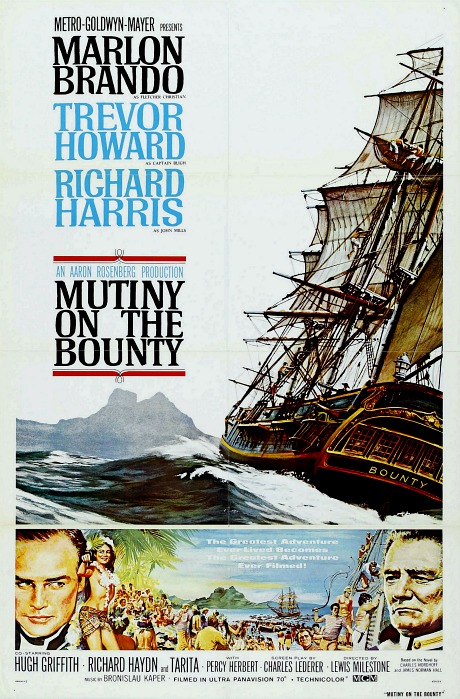
Market/Mission
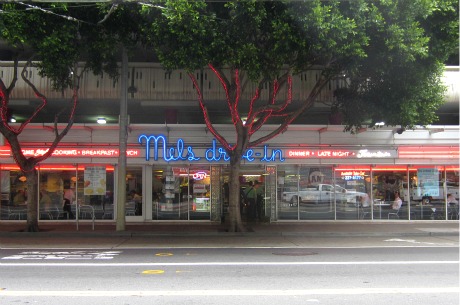

To me this building, no matter how the Chronicle fares as a going concern, will always be the home of David Fincher’s Zodiac.

One day this truck will end up in some San Francisco museum, and the plaque will explain what newspapers were and how they were printed on paper with black ink, and how trucks like this would deliver bundles of same to newsstands around the city.
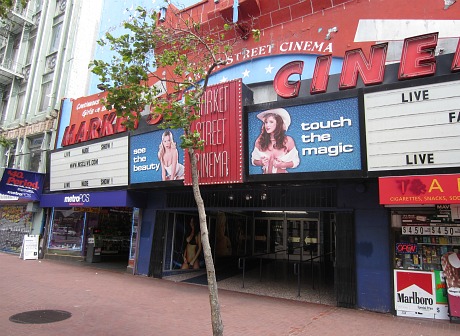
This Market Street theatre used to be a subrun. I went to a double feature here in 1983, or so I recall.
Further Holmes Agony
Tell me how or why Sherlock Holmes: A Game of Shadows (Warner Bros., 12.16) is going to be significantly different than the ’09 original. Same arrogant attitude, same steampunk, Robert Downey, Jr. and Jude Law again, same director (Guy Ritchie), same producer (Joel Silver), etc. No motive to do anything but repeat what worked before.
Posted on 12.27.09: “ Sherlock Holmes is a corporate disease movie — a period put-on concept that reaches out from the screen like a grinning Irish banshee and surrounds you with frigid air and induces a gradual comatose state.
“Actually, forget the banshee. I felt as if I was strapped to a gurney with a plastic tube snaking out from the screen with poison slowly feeding into my arm from an IV drip. I was sinking, dying…going under.
“I hated the film, yes, but mainly myself for having paid money to see it at the godawful Hell Pit known as the Regal Union Square Stadium 14. Myself and my son Dylan, scrunched into the rear row of the front section with an older couple to my left and two women to their left who were sick and tired of my coming and going (especially the final time). And I didn’t blame them.
“There’s one aspect that deserves favor. Robert Downey, Jr. has assembled a Holmes personality apparently based on his own personal situation as he made the film — a bright and gifted fellow who’s ‘not there’ in a kind of Dylanesque sense, and therefore has a certain something or other that holds the tiller steady. A certain fuck-all integrity? Determination? A willingness to succumb to corporate corruption?
“I only know that Downey has figured out a way of ‘being’ in this godawful film that holds together on some level, and that in place of exuding anything real or substantial (and what actor would attempt this under these ridiculous circumstances?) Downey ambles through with a kind of rock-solid aloofitude that…well, kind of works.
“Which is to say a kind of attitude dance in which he’s a 40ish fellow who goes ‘eewhh, eewhh’ and ‘doop-poop-pee-doop’ and ‘who, me?’ no matter what happens or who says what or what deathly dull villain with brownish or missing teeth is threatening him. He’s playing dry, bent, whimsical, unperturbed. He’s never been more boring, and it was the only way he could have gone, given the stakes and the salary and the bullshit levels.
“And Jude Law, as Holmes’ soul mate, minder and platonic lover Watson, is playing admonishing, dryly perturbed and always patient. And away they go down the muddy London lane. Enjoy their fey verbal ping-pong or not, but if you don’t (and I didn’t, not really) then you’re dead and so is the movie. Because there’s nothing else to hold onto. Well-dressed demonic evildoers…I’m sorry, did somebody say ‘well-dressed demonic evildoers’? The mucky 19th Century period atmosphere is all skank and slime and dust and splinters and squalor — I’m putting myself to sleep just remembering what it was like.
“I can’t remember any reviews that have commented on Philippe Rousselot‘s desaturated-color cinematography. It’s awfully murky and dark — seriously underlit, I mean — and quite oppressive for that. Maybe the brightness levels (i.e., foot lamberts) in the Regal projector showing the film had been deliberately turned down. Theatre chains do this, I know. All I know is that I was muttering to myself, ‘This godawful thing doesn’t even look good…I can’t even cruise along on the craft of it, for God’s sake.”
“This isn’t Wild Wild West, but it’s a similar kind of travesty.”
Sleepover Time
I saw and quite liked David Robert Mitchell‘s Myth of the American Sleepover (Sundance Selects 7.22) at the 2010 Cannes Film Festival — 14 months ago. And now it’s finally opening a week and a half from now. And it deserves a looksee because as small-town teenage community movies go, Mitchell’s film isn’t far from the realm of George Lucas‘s American Graffitti, and that ain’t hay.
I said in Cannes that Myth “goes against the grain of typical teen-relationship flicks by being much smarter, better acted, more subtle and not reliant on animal-level humor (or animal-level sensibilities in the seats).” I said that “nothing feels written or faked…each and every scene has a natural ease and honesty.”
Also: “It goes without saying that a teen movie of this calibre is doomed to fail because it’s not coarse or stupid enough….kidding! Well, half-kidding. But what is it about under-25 Eloi not only seeming to prefer movies packed with tedious cliches and recoiling when something fresh and true and semi-original (like Myth) comes along?
My only complaint was as follows: “The characters in Myth all seem so passive, so low-energy whatever. If I was under fire and taking cover in Afghanistan, I’m wondering which of these kids, if they were also there, would have the cojones to shoot back like Val Kilmer did in Heat? They’re all about whim and instinct and going with dreamy feelings.
“That’s the realm and the psychology of being 18, of course, but what is life at any age without tests of character in hairy (or at least semi-hairy) situations? You know, like with Richard Dreyfuss showed in American Graffitti when he hung out with the Pharoahs?
Underline This
“If you’re talking social mobility, yes…that has always been the American Dream. The ability of one generation to do better than the generation that spawned them. That was always the American Dream. Well, we’re tenth in the American Dream [ratings] right now. We’re tenth in social mobility, compared to other countries around the world. Which is like Sweden coming in tenth in Swedish meatballs or something. It’s just a shame.” — Blll Maher talking to CNN’s Piers Morgan, video posted July 11th.
This clip about Bachmann vs. Palin isn’t too bad either.
Well-Known Ingredients
Posted today by Badass Digest‘s Devin Faraci, this Alfred Hitchcock cook-book short is a graduation project from students at the University of Applied Sciences and Arts in Hannover, Germany.
True Story
After last night’s Dolby seminar (or sometime around 9:40 pm), I checked into the Mark Hopkins hotel. A youngish desk clerk gave me two pass cards to a room on the sixth floor. I went up there, slipped the plastic card into the door slot, and walked in. The first thing I saw was a short hallway with a right-turn ahead — obviously a fairly big room. But the TV was already on…strange. I took the turn and came upon a middle-aged couple lying on the bed, watching CNN.
They stiffened and sat up and said “Oh, Jesus!,” “My God!”, “What are you doing?” and expressions to that effect. The guy leapt off the bed to defend the territory and his lady. “Whoa, whoa….sorry!” I hurriedly said, holding up my hands. “I was given keys to this room by the desk. It’s a mistake. Obviously I got in with the card so I didn’t break in. Truly sorry.” The guy collected himself and acknowledged that a mistake had clearly been made, and I turned right around and bolted the hell out of there.
The desk clerk was shocked, ashen-faced. “You are Jeffrey Wells, right?” Definitely, I said, and showed him my ID. He apologized and double-checked. Believe it or not, the name of the guy I walked in on is also named Jeffrey Wells. Same name, same hotel…what are the odds? I wasn’t pissed — just amazed and amused. The clerk smiled and said “Thanks for being understanding” as he gave me the cards for the new room, which is on the third floor.
My current room is about half the size of the other Jeffrey Wells’ room. It feels like the garbage-compression room in Star Wars — i.e., the room that Han, Leia and Luke are stuck in as the walls start moving in and making the room smaller and tighter by the second.
If Nancy Meyers had written and directed the scene when I walk in on the other Jeffrey Wells, he and his wife would have been obese tourists from Missouri and having some kind of contortionist sex on the bed. As I turned the corner and stood before them they would have both leapt off the bed with terrified expressions and gone “Aaaaaahhh! Aaaaaahhh!” And I would have stood there and also gone “Aaaaaahhh! Aaaaaahhh!” And then the hotel dicks would be knocking on the door and I’d be cuffed for breaking into a room, etc.
Dolby Immersion
I’ve finally figured out what the big deal is with Dolby Surround 7.1, which is not new and has actually been installed in some 2100 theatres. But until tonight I didn’t fully understand what makes this sound system a distinctive development. The ins and outs were discussed this evening by several sound specialists at a Dolby headquarters seminar in San Francisco, but I didn’t really get it until I spoke to Dolby marketing manager Stuart Bowling after it ended.
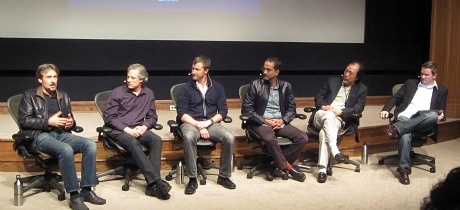
At this evening’s Dolby Labs seminar on Dolby 7.1 Surround: (l. to r.) Eric Brevig, Skywalker Sound’s Michael Semanick, Transformers 3/Tree of Life sound designer Eric Aadahl, director-producer Rohan Sippy, sound designer Kinson Tsang, and (far right) Stuart Bowling, Dolby Laboratories technical marketing manager.
So here’s the shot in layman’s terms. Dolby Surround 7.1 basically delivers super-clear, highly immersive sound from four discreet sound “zones” — front, left, right and rear. But that’s what Dolby 5.1 delivered, right? No, there’s a difference. To really hear all four channels with Dolby 5.1 you had to sit in a theatre’s “sweet spot,” which is more or less dead center. Dolby 7.1 delivers loud and distinct super-quad sound in almost any section in the theatre. You don’t need to be in a sweet spot to really hear it. So there you go. That’s the thing.**
Early this evening Dolby management and publicists hosted an elegant dinner on the third floor of company’s headquarters on Potrero Street. I arrived a bit late due to my Burbank-to SFO plane being delayed by fog. The seminar, an agreeably informative thing, lasted for a couple of hours. The panelists were Eric Brevig, Skywalker Sound’s Michael Semanick, Transformers 3/Tree of Life sound designer Eric Aadahl, director-producer Rohan Sippy, sound designer Kinson Tsang, and moderator Stuart Bowling, Dolby Laboratories’ technical marketing honcho.
I asked a question about how everyone at sound seminars always talks about creating big, loud soundtracks for big tentpole blockbusters while I prefer subtle, more human-level sounds, and that the world of aural cinema (including the realm of Dolby Surround 7.1) is far too vast and delicate and all-encompassing for seminars like this one to focus only on the sounds of explosions, blam-blams, face-punchings, rib-punchings, gunfire, helicopter blades, and blah, blah.
There’s a breakfast tomorrow morning from 8 am to 9 am, and then Ioan Allen‘s “The Egg Show” (i.e., some kind of instructive lecture about the history of sound design) and then a lunch and bunch of other seminars and screenings of Legend of the Fist: The Return of Chen Zhen and Dum Maaro Dum and then a cocktail party from 8 pm to 10pm and so on. A very full day.
** Dolby Surround 7.1 is also savorable through Bluray and other non-theatrical modes with the same four-channel discretion.
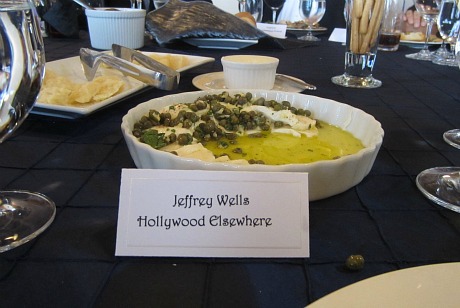
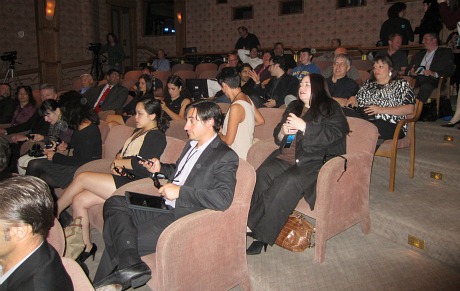
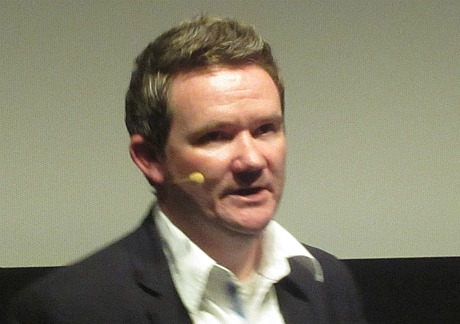
Dolby technical marketing manager Stuart Bowling, a.k.a. “Answer Man.”
Pacino Spector
A day or so ago a New York Post photographer captured Al Pacino in one of his Phil Spector guises in the currently-rolling HBO biopic of the now-imprisoned music producer, which David Mamet is directing. Spector wore a big moustache and long, side-combed frizzy hair in the ’70s or early ’80s, so that seems to be the inspiration. Except Al’s hair isn’t frizzy. Get it right, fellas. It’s not hard.
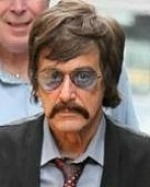


(l.) Pacino as Spector; (center) Spector with moustache and frizzy hair in the ’70s; (r.) courtroom Spector.

